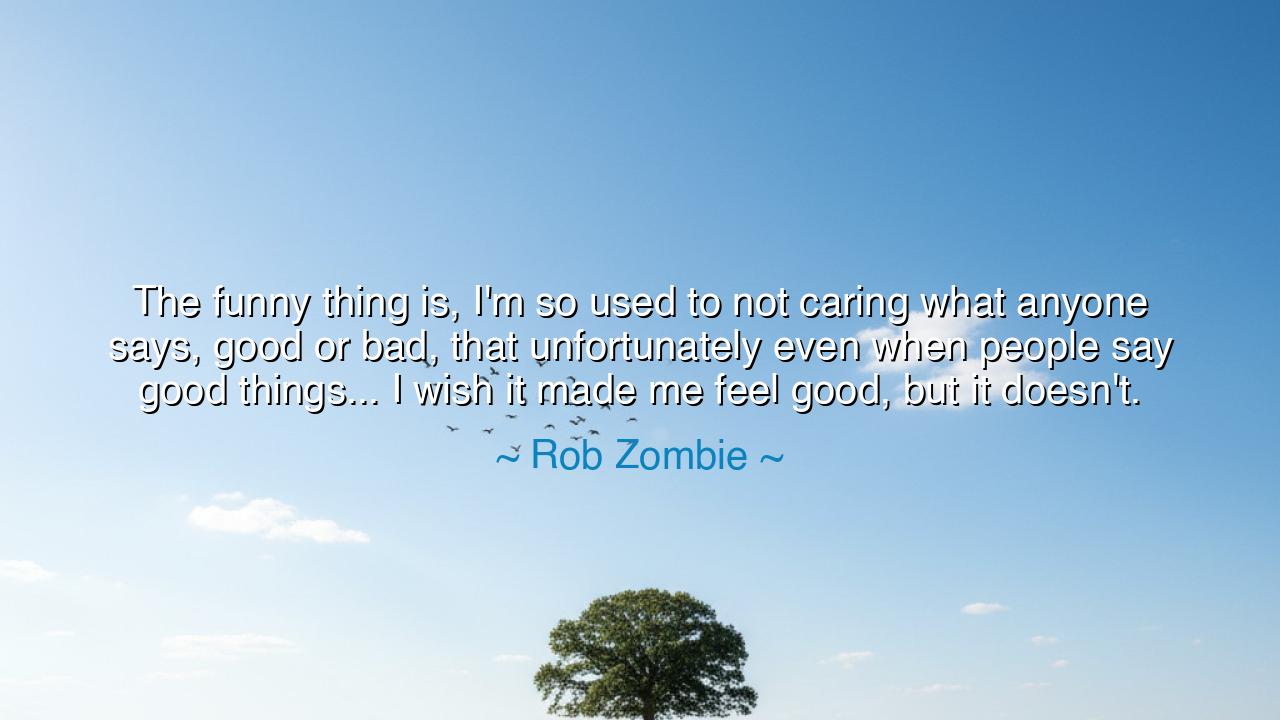
The funny thing is, I'm so used to not caring what anyone says
The funny thing is, I'm so used to not caring what anyone says, good or bad, that unfortunately even when people say good things... I wish it made me feel good, but it doesn't.






In the words of Rob Zombie, “The funny thing is, I'm so used to not caring what anyone says, good or bad, that unfortunately even when people say good things... I wish it made me feel good, but it doesn't.” Here speaks a soul that has weathered the storms of judgment, praise, and misunderstanding — a voice born from years of creation under the eyes of both lovers and haters. It is a lament wrapped in resilience, a confession from one who has learned to be strong, but at a cost. This quote reveals a truth as ancient as the first artist who carved his heart into stone for the tribe to see: that indifference can protect the heart, but it can also numb it.
To the ancients, the hero’s greatest trial was not the sword or the beast, but the struggle of feeling versus endurance. The one who fears pain learns to harden himself, but in doing so, he often silences the music of his own spirit. So it is with Rob Zombie’s words — he has mastered the art of not caring, of standing tall amid criticism and scorn, but in that armor of self-preservation, something precious has faded: the ability to feel joy from the echoes of admiration. The wall that keeps out arrows also blocks the sunlight.
We can see this same story written in the life of Marcus Aurelius, emperor and Stoic. Surrounded by flatterers and enemies, he trained his mind to be unmoved by both praise and insult. He wrote, “Receive wealth or prosperity without arrogance; and be ready to let it go.” His discipline made him wise, but it also made him solitary. He learned to endure everything — yet the very detachment that preserved his peace may have cost him the warmth of simple human joy. Like Zombie, Marcus had learned to feel nothing in order to be unbroken, and in this paradox, we glimpse the sorrow of the strong.
To be indifferent to criticism is to find freedom. The artist, the warrior, the dreamer — all must learn this or perish under the weight of voices that misunderstand them. But to be indifferent to praise is another kind of death — a quiet, spiritual one. For joy is the nourishment of the soul, and if we cannot receive it, we begin to fade. Zombie’s confession is not one of pride but of mourning: he has become so used to standing alone that even love cannot reach him. What once was strength has become a fortress without a door.
And yet, there is wisdom in his honesty. It teaches that balance is the true armor of the soul. One must not be a slave to approval, but neither should one become deaf to the music of kindness. To reject both good and bad words alike is to deny the mirror that helps us see ourselves clearly. The sages of old spoke of the “middle path,” where one may walk in dignity — receiving praise with gratitude, receiving criticism with calm, and letting neither rule the heart. To live without this balance is to lose the sweetness of being human.
Consider the story of Van Gogh, who painted in obscurity, misunderstood by nearly everyone. He too learned to numb himself to the world’s rejection — yet when, on rare occasions, someone praised his art, he wept. The man who could not profit from success still longed for connection, for acknowledgment that his pain had meaning. His story echoes Zombie’s words: when the soul grows too accustomed to solitude, even love can feel foreign. The human heart, denied too long, forgets how to receive.
Thus, let the lesson be this: strength must not become stone. Build your armor, yes — but let it breathe. Let the arrows of the world glance off, yet when the hand of friendship or admiration reaches out, do not recoil. To feel is not weakness; it is the sign that the spirit still lives. The goal is not to be unmoved, but to be unshaken — to remain open without being consumed.
Practical teaching: Each day, when someone offers you kind words, do not brush them aside. Pause. Let them in, even if just a little. Whisper to yourself, “I will not let indifference become my prison.” Reflect on your defenses — which ones protect you, and which ones isolate you. Learn to take praise as a gift, not a chain; criticism as a lesson, not a wound. For in this dance between strength and sensitivity, you will rediscover the full rhythm of life. And perhaps then, when the world speaks goodness to you, you will finally feel it — not as noise, but as light warming the heart that had forgotten how to receive.






AAdministratorAdministrator
Welcome, honored guests. Please leave a comment, we will respond soon